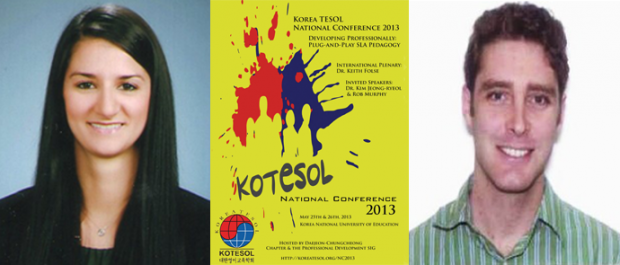
Consideration of ‘Classroom Chemistry’ in an EFL Context
Jenica Park and Ryan Finnegan
Abstract
Since the mid 1980s, educators have championed the positive effects of group work on language acquisition (Chen & Hird, 2006). Furthermore, many TESOL professionals and researchers have investigated the factors that influence student interaction during group work, and therefore promote or hinder language learning (Sachs et al., 2003). We would like to use this framework to analyze the dynamics of classroom communities in a more holistic sense.
Instead of focusing on the factors that impact small group interactions, we aim to address a different set of factors that influence the classroom community as a whole. Specifically, we confront the question of why the same lesson can be taught to several different classes of similar language abilities, yet the lesson has a range of different outcomes in terms of level of interaction and student reception. Intuitively, one might assume the answer to this question lies within the realm of “classroom chemistry.”
Along these lines, there seems to be a scarcity of research in the field of TESOL. However, the subject has been broached by Hilligoss (1992), operating in the field of Sociology. Hilligoss defines classroom chemistry as the combined effect of students’ personalities on classroom community. Although seeking to dispel the myth, Hilligoss acknowledges that most teachers believe classroom chemistry is something that cannot be changed.
We agree with Hilligoss and would like to argue that not only can classroom chemistry be changed, but sometimes must be, because of its significant impact on lesson effectiveness. In this presentation we seek to identify the factors that influence classroom chemistry in an EFL setting, and the ways in which classroom chemistry affects language acquisition. Finally, we will present methods that teachers can use to promote positive classroom chemistry.
Bio-sketches
Jenica Park currently teaches credit English courses at Chonbuk National University in Jeonju, South Korea. She completed a year as a public high school English as a Foreign Language (EFL) teacher, working for the Seoul Metropolitan Office of Education in Seoul, South Korea. She taught conversational English and English for Tourism courses at Daeil Tourism and Design High School. Jenica earned her Bachelor’s Degree from the University of Nevada, Reno (UNR) in Spanish, spending one semester abroad in Madrid, Spain, and also received a minor in Teaching English to Speakers of Other Languages (TESOL). She earned her Master of Art’s in TESOL from UNR in 2011.
Ryan Finnegan has been living and teaching in South Korea since 2011. He currently serves as an English Instructor at Chonbuk National University in Jeonju. Ryan obtained his MATESOL from the University of Nevada, Reno. He received his Bachelor's of Arts in History from San Diego State University.


